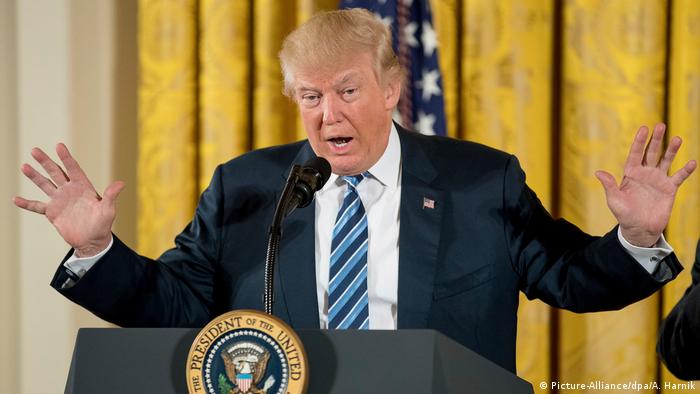TOP STORIES NEWS Ethics lawyers to file suit against Trump alleging constitutional violation
- Albanian Shqip
- Amharic አማርኛ
- Arabic العربية
- Bengali বাংলা
- Bosnian B/H/S
- Bulgarian Български
- Chinese 中文
- Croatian Hrvatski
- Dari دری
- English English
- French Français
- German Deutsch
- Greek Ελληνικά
- Hausa Hausa
- Hindi हिन्दी
- Indonesian Bahasa Indonesia
A group of lawyers has announced plans to file a federal lawsuit against President Donald Trump for allowing his businesses to accept payments from foreign governments. They argue that this violates the US Constitution.
A legal watchdog group, including constitutional scholars and ethics lawyers, plans to file a lawsuit on Monday against newly sworn-in US President Donald Trump over his business practices with foreign governments.
The lawsuit is being brought by the liberally-funded Citizens for Responsibility and Ethics in Washington (CREW) including Richard Painter, a former ethics lawyer for Republican President George W. Bush and Norman Eisen, who had the same role in the Obama administration.
In a statement on Monday, CREW laid out its allegations that Trump violated an anti-bribery clause in the US Constitution since his business properties abroad function in part based on goodwill from foreign governments.
"We did not want to get to this point. It was our hope that President Trump would take the necessary steps to avoid violating the Constitution before he took office," CREW executive director Noah Bookbinder said in the statement.
"We were forced to take legal action," he said.
Foreign state payments
The CREW statement said that since Trump has not fully divested from his businesses, he is receiving "cash and favors" from foreign governments in the form of hotel room payments, building leases and various real estate deals.
"When Trump the president sits down to negotiate trade deals with these countries, the American people will have no way of knowing whether he will also be thinking about the profits of Trump the businessman," the watchdog said.
Trump stopped short of fully divesting from his businesses prior to taking office, leaving his two eldest sons in charge of the Trump Organization in his absence.
Eric Trump, now an executive vice president of the Trump Organization, decried the planned suit and said the company agreed to donate profits from foreign government guests at Trump-owned hotels to the US Treasury.
"This is purely harassment for political gain," Eric Trump told "The New York Times," adding that they had taken more steps than were required by law to avoid possible conflicts with national policy.
The battle over the 'emoluments' clause
The suit centers on a clause in the US Constitution barring federal officials from receiving an emolument or payment from a foreign government.
The clause specifically states that a person "holding any office of profit or trust under them" is barred from accepting gifts or emoluments from "any king, prince or foreign state" without congressional approval.
The legal watchdog group argues that the clause forbids Trump from accepting payments from foreign governments.
Trump's lawyer Sheri Dillon previously told a press conference that "fair-value exchange," such as paying for a hotel room, does not run afoul of the constitutional ban on accepting foreign gifts or payments.
Trump's latest hotel project at the Old Post Office building in Washington D.C. poses another legal hurdle. His lease with the federal government to develop the hotel explicitly prohibits any elected official from benefiting from the property - but Trump has not divested from the project or from the rest of his company.
CREW filed a separate complaint about the Old Post Office Trump hotel project on Friday, the "New York Times" reported.
No conflict of interest for the president?
For months, Trump has been saying that his status as president means he does not have conflicts of interest.
"I have a no conflict of interest provision as president," Trump told a press conference earlier this month. "So I could actually run my business, I could actually run my business and run government at the same time."
Indeed, Congress did pass legislation in the late 1970s and 1980s that exempted the president and vice president from conflict-of-interest laws for federal employees in the executive branch.
Despite the exemption, it is common for presidents to distance themselves from their personal finances or to sell their assets and put cash into a blind trust.
Monday's case is the start of a wave of litigation expected to be filed against the new US president by liberal advocacy groups.
rs/se (AP, AFP, Reuters)




Comments